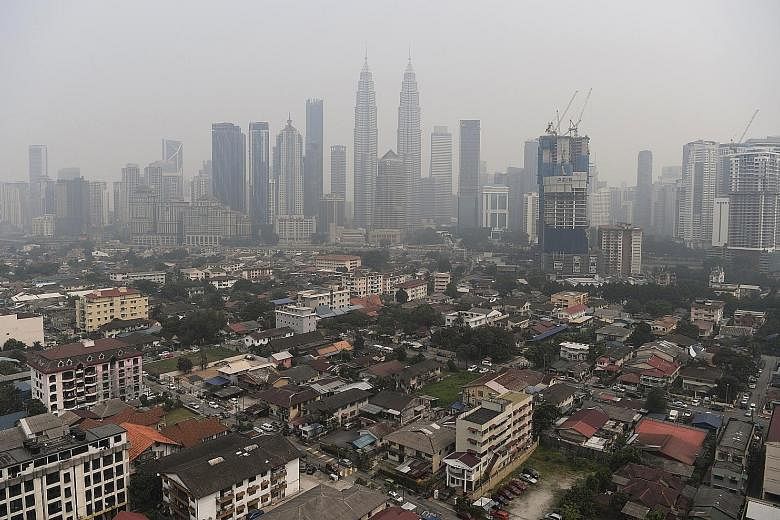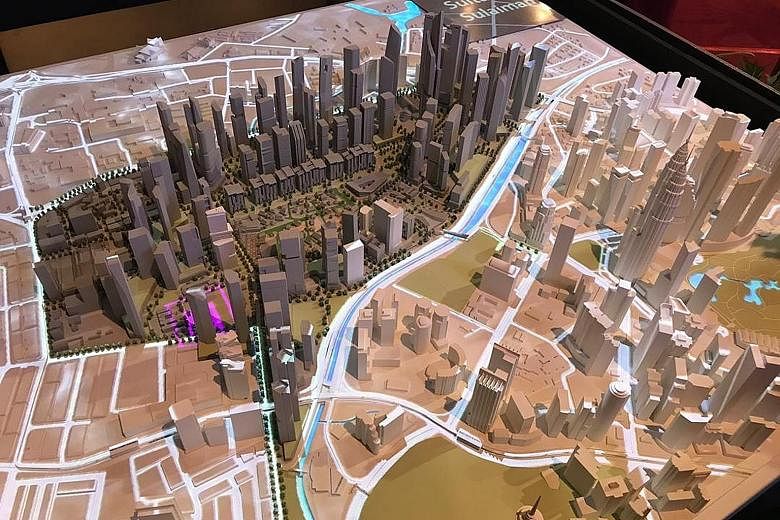Malaysian Prime Minister Mahathir Mohamad's government yesterday made a fresh attempt to kick-start the redevelopment of Kuala Lumpur's biggest Malay enclave, by offering a price of RM850 (S$280) per sq ft (psf) for land owned by residents.
With growing views that Malay support for the Pakatan Harapan (PH) administration has eroded badly, Federal Territories Minister Khalid Samad told residents of the Kampung Baru enclave that Malays will continue to have a place in Malaysia's economic heart.
The government is offering residents an option to sell their land to it, engage them as stakeholders to redevelop the area and own a fully paid-up unit or a "cash and high-rise" unit.
"The most important thing is we're offering to them a higher quality of living, competitiveness, sustainability and inclusiveness in maintaining the Malay tradition," Mr Khalid said at a town hall meeting with residents. "On average, each land plot stands to receive RM6 million worth in compensation."
At present, there are between 3,500 and 4,500 residential units in Kampung Baru, with some 5,700 landowners.
Through the redevelopment, the government plans to build 45,000 residential units, half of which will be affordable homes called Residensi Wilayah.
The sprawling 119-year-old Kampung Baru contains old village homes on small plots of land to rundown apartments.
This is a far cry from the swish condos and gleaming office towers, including the Petronas Twin Towers, just across the narrow Klang River.
In downtown KL, a small condo unit sells for RM2 million each.
In Kampung Baru, a three-bedroom unit at the upcoming Legasi Kampong Bharu condo was offered at RM300,000 at its launch.
Kampung Baru is spread over 90ha of land - slightly larger than Singapore's Botanic Gardens.
Several residents, whom The Sunday Times met, gave a thumbs-down to the offer, saying the RM850 psf offer is too low, compared with units in top-end KL condos that could fetch RM5,000 psf.
"If nearby places, such as the KLCC (Kuala Lumpur City Centre) can fetch up to RM5,000 per sq ft, we'd be happy to receive just RM4,500 per sq ft," said resident Baharuddin Abdul Karim, 55. "Don't insult us by giving that price (RM850 psf)".
Madam Hashidah Abdul Razak, 61, said: "Our land is in a prime area and in the heart of the city. I'm hoping that they will increase the rate".
Mr Zainal Alam Ahmad, 65, said: "An MRT station is just behind my house in Jalan Raja Abdullah, why would I accept RM850 per sq ft if someone from a different kampung - who doesn't have the same access to KLCC - gets the same price? That's not fair."
Mr Khalid said the offer was at the upper band of an assessment made by the Valuation and Property Services Department.
He said prices cannot match those in downtown KL as the enclave is gazetted "Malay reserve land". This means that non-Malays cannot buy the plots, thus greatly reducing the pool of cash-rich buyers.
The PH government is not the first to attempt redevelopment of the area. But the issue is an emotive one, as the area is seen as the political heart of Malays in KL.
Kampung Baru's history is tied to events such as the 1969 race riots and the 1998 Reformasi rallies, while major anti-government protests are often launched there.
Tun Dr Mahathir, in a video presentation shown at the town hall meeting, said allegations that the development will push the Malays out of KL are baseless.
He said plans to redevelop the enclave were discussed from the 1980s.
"On one hand, it is the symbol of Malay pride in the federal capital and on the other hand, while Kuala Lumpur has grown to become a metropolis, time has apparently stood still in Kampung Baru and the disorganised situation and congestion made it unappealing," he said.


